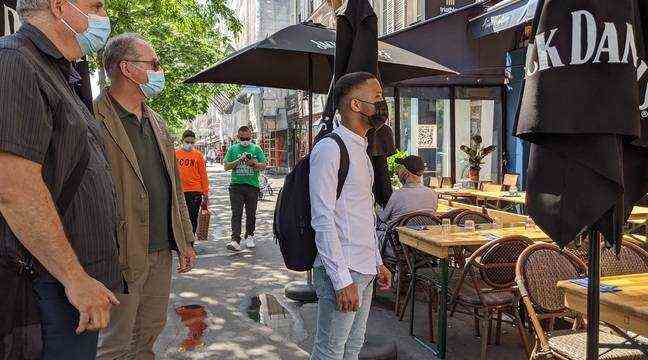The three agents of the departmental directorate for the protection of populations ensure that the health protocol is well respected – Caroline Politi / 20 Minutes
- This Wednesday, restaurants can once again welcome dining room customers, up to 50% of their capacity.
- Inspectors from the departmental population protection directorate in Paris ensure that the protocol is respected.
- If for the time being, pedagogy takes precedence, in the event of non-compliance with these rules, an administrative closure may be ordered.
A few minutes from the midday shot, Jocelyne, manager of a pizzeria close to Place de la République, in the 11th arrondissement of Paris, does not have a minute to rest. After six months of closure due to the coronavirus pandemic, it no longer knows where to turn between the tables to clean and set up, the small terrace to be fitted out, the parasols to be taken out. “Can’t you come back tomorrow, is it a bit complicated anyway?” “, She breathes when three inspectors of the departmental direction of the protection of the populations in Paris, in charge of ensuring that the sanitary rules are respected, appear at the door.
“It really won’t take long,” insists Major Patrick Martin, seeing that a little reminder of the new protocol that entered into force on Wednesday is not too much. If the hydroalcoholic gel and the slates – to prevent the menus from passing from hand to hand – are already on the tables, she was unaware that she was required to put up a sign specifying the maximum number of places in her. establishment – 50% of total capacity until June 30 – and a notebook to collect the names and telephone numbers of customers.
“You can also install the Stop Covid application so that people only have to scan a QR Code”, explains the health worker. Facing him, the 71-year-old restaurateur looks a little puzzled. “You know, if I could, I would only accept vaccinated people,” she says. “Ah no, that madam, you cannot, it is not obligatory”, one answers him.
An educational mission
This Wednesday, it’s time for pedagogy. “Unless of course we come across tables of 30 people,” smiles Tommy Joncart, inspector of competition, consumption and the repression of fraud. For a year and a half, the health protocols enacted according to the “waves” of the epidemic have evolved so many times that some are struggling to navigate.
A few steps from the pizzeria, the agents noticed, in an oriental restaurant, a table set for eight people. “Sir, it’s six people maximum per table inside,” recalls the inspector. “Yes, I know, I have planned to install four customers here but I prefer to set all the tables, it shows that the restaurant is alive”, answers the restaurateur. On the other hand, he too was unaware that he was required to put a QR code at the entrance to his restaurant or, failing that, a notebook. “We are drowned in a lot of information, he confides, but I’m not complaining, compared to other countries, we have been helped a lot. “
A single manager seems to have little knowledge of the measures
In an hour and a half, these agents from the Paris police headquarters went to five restaurants. No major infringement has been observed, the sun, it is true, pushing customers to sit on the terrace – now fully accessible – rather than in the dining room. And only one of the managers, speaking very poor French, seemed unfamiliar with the measures.
Officers plan to screen him again as early as next week to make sure all sanitary measures have been taken. If this is not the case, a formal notice raising all the non-compliant points will be notified to him. He will then have 24 hours to fall into line before the neighborhood police station carries out a new check which may lead, this time, to the administrative closure.
“Fortunately, it is very rare, our mission is above all to support these restaurateurs”, underlines Eddy Kassa, deputy head of the “cafes and restaurants” department. And even more in this time of health crisis. During these checks, many confide in them their difficulties and their fears after these six months of forced closure. Jocelyne, who takes a month’s vacation each year in August, plans to stay open all summer to try to make up for the shortfall. His neighbor, he hopes that all these measures will allow them not to have to close. “It would be catastrophic,” he breathes.

